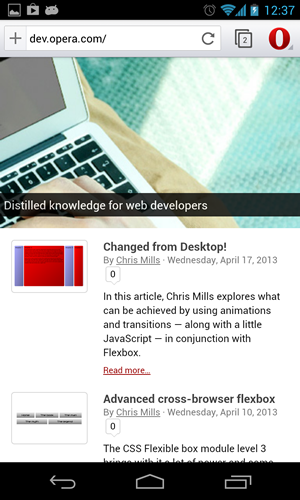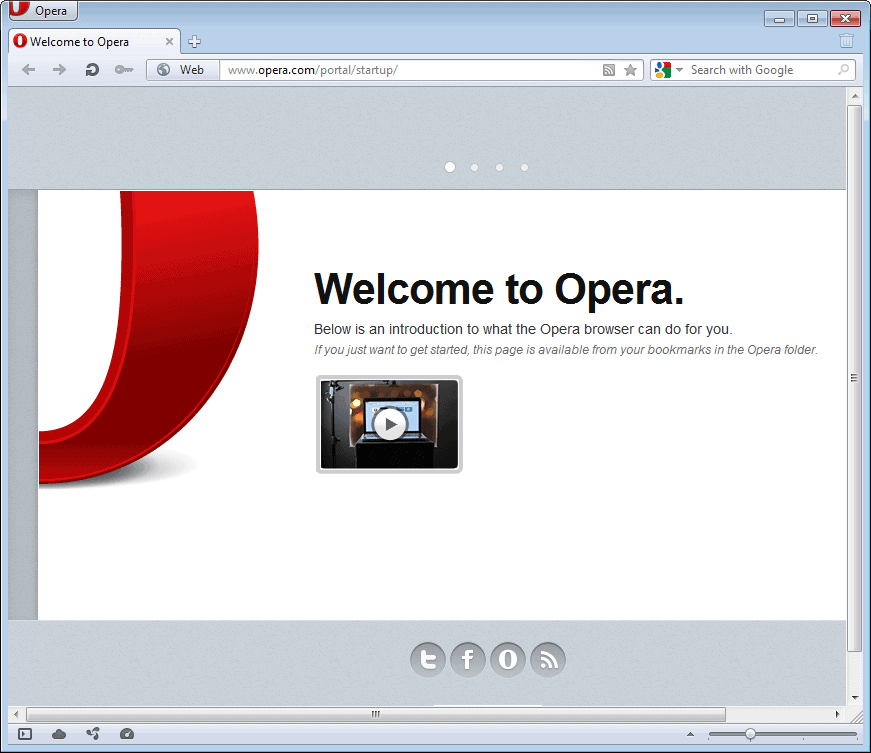-
Changelog For Opera 6.03 For Mac카테고리 없음 2020. 1. 28. 05:15

MultiTorg Opera The history of the web browser began in 1994 when it was started as a research project at, the largest Norwegian telecommunications company. In 1995, the project branched out into a separate company named, with the first publicly available version released in 1996. Opera has undergone extensive changes and improvements, and introduced notable features such as Speed Dial. Until version 2.0, the Opera browser was called MultiTorg Opera (version 1.0) and had only a limited internal release—although it was demonstrated publicly at the in April 1995. It was known for its (MDI) and 'hotlist' (sidebar), which made browsing several pages at once much easier, as well as being the first browser to completely focus on adhering to the standards. In February 2013, Opera Software announced that their in-house rendering engine, would be phased out in favour of. Opera 15 saw the browser being fully rewritten, with this and subsequent releases being based on.
External Source, CONFIRM, http://www.opera.com/docs/changelogs/mac/1201/.
- Opera for Mac computers gives you a fast, efficient, and personalized way of browsing the web. It comes with a sleek interface, customizable Speed Dial, the Discover feature, which helps you find fresh web content, the data-saving Opera Turbo mode, visual bookmarks, over 1000 extensions.
- Changelog since Opera 10 beta 3 User Interface Added * New Opera product icon Improved * Opera Turbo dialog box margins and whitespace * Tab states and positioning of the Standard Skin.

Contents. Desktop versions Version 2 Version 2.0, the first public release of Opera, was released as in 1996. Due to popular demand, Opera Software showed interest in programming its browser for alternate operating systems such as,. On October 10, 1997, they launched 'Project Magic', an effort to determine who would be willing to purchase a copy of their browser in their native OS, and to properly distribute funds to develop or outsource for such operating systems. On November 30, 1997 they closed voting for which operating system to develop with. Project Magic then became a news column for updates for alternate operating systems until version 4.
Version 3. Opera 3.62 Opera 3 was the first version of Opera with support, but was still missing. It was released for multiple operating systems on December 31, 1997. In 1998, Opera 3.5 was released, adding (CSS) support and file upload capability. Since version 3.5, Opera has supported CSS, and, one of the inventors of CSS, is the at Opera.
Up to 6.0 Opera supported most common web standards, Netscape plugins and some other recent standards such as and for wireless devices, but its implementation of advanced (of which 'JavaScript' is an implementation) and the was poor. Version 3.6 was released on May 12, 1999.
The 16-bit version of Opera for Windows 3.62 was the final version available for. Further releases would require. Version 4 On June 28, 2000, Opera 4 for Windows (Elektra) was released, introducing a new core, and a new. Version 5. Opera 6.0 On November 29, 2001, Opera 6 was released with new features including support, and offering a as well as the allowed by previous versions.
First MSN.com controversy On October 24, 2001, blocked users of browsers other than Internet Explorer, including Opera, from accessing.com. After cries of monopolistic behavior, Microsoft lifted the restrictions two days later.
However, as late as November 2001, Opera users were still locked out from some MSN.com content, despite Opera's ability to display the content had it been served. Version 7. Opera 7.02 On January 28, 2003, Opera 7 was released, introducing the new ' layout engine, with improved CSS, and (DOM) support. Support was dropped.
Version 7.0 saw Opera undergo an extensive rewrite with the faster and more powerful. The new engine brought almost full support for the HTML meaning that parts of, or a whole, page can be re-rendered in response to DOM and script events. A 2004 review in described Opera 7.5 as being excessively complex and difficult to use. The review also criticized the free edition's use of obtrusive advertisements when other browsers such as and were offered free of charge without including advertisements. In August 2004, Opera 7.6 began limited alpha testing.

Changelog For Opera 6.03 For Mac Download
It had more advanced standards support, and introduced voice support for Opera, as well as support for Voice XML. Opera also announced a new browser for Interactive Television, which included a fit to width option Opera 8 introduced. Fit to Width is a technology that initially utilized the power of CSS, but it is now internal Opera technology. Pages are dynamically resized by making images and/or text smaller, and even removing images with specific dimensions to make it fit on any screen width, improving the experience on smaller screens dramatically.
Opera 7.6 was never officially released as a final version. On January 12, 2005, Opera Software announced that it would offer free licenses to higher education institutions, a change from the previous cost of $1,000 USD for unlimited licenses.

Schools that opted for the free license included (MIT),. Opera was commonly criticized for having been, since this was seen as a barrier to gaining market share. In the newer versions the user was allowed a choice of generic graphical banners, or text-based targeted advertisements provided by Google based upon the page being viewed. Users could pay a license fee to remove the advertisement bar. Second MSN.com controversy In 2003, MSN.com was configured to present Opera browsers with a used for old versions of Microsoft. Other browsers received either a style sheet tailored to them, or at least the latest Internet Explorer style sheet.
The outdated style sheet that Opera received caused Opera to move a significant amount of MSN.com's content 30 to the left of where it should be, distorting the page and making it appear as though there was a bug in Opera. In response, the company created a special ' edition of Opera which displayed gibberish instead of MSN.com but not on any other web site. They said they did this to make a point about the necessity of a harmonious relationship between web browsers and web sites. After the complaints, Microsoft changed their servers to present the latest version of Opera, version 7, with the style sheet served to the latest version of Internet Explorer, which resolved the problem.
However, Microsoft continued to serve the outdated style sheet to the older Opera 6. Hotmail controversy In November 2004, sent an electronic message to, complaining that Opera users were sent an incomplete file when using (now Outlook.com).
The incomplete file prevented Opera users from emptying their 'Junk E-mail' folders. The Opera Software company later sent a physical letter to Microsoft.
Nevertheless, as of February 11, 2005, Microsoft had neither replied to the messages nor corrected the issue. Version 8. Opera 8.0 Wikinews has related news:. On April 19, 2005, version 8.0 was released. Besides supporting Tiny, multimodal features and, the default user interface was cleaned up and simplified. The default home page was an improved search portal.
The changes displeased a number of existing users since some advanced settings became hidden. Version 8.0 introduced support for (SVG) 1.1 Tiny. This marked the first major web browser to natively support some form of SVG. Version 8.5 was released on September 20, 2005. Opera announced that their browser would be available free of charge and without advertisements, although the company still continued to sell support contracts.
Enhancements included automatic client-side fixing of web sites that did not render correctly, and a number of security fixes. Version 9.
Opera Mobile Classic can be used on smartphones such as the. Opera Mobile Classic Opera Mobile Classic, formerly called, is an edition of Opera designed for and (PDAs). The first version of Opera Mobile Classic was released in 2000 for the and, with a port to the platform coming in 2004. One of Opera Mobile Classic's major features is the ability to dynamically reformat web pages to better fit the handheld's display using technology. Alternatively, the user may use for a closer or broader look.
However, Opera Mobile's has come under fire for being difficult to use or customize. Opera Mobile Classic was replaced by Opera browser for Android. Internet Channel for Wii is a web browser for Nintendo's gaming console made by Opera Software.
Internet Channel was free to download from its release on 12 April 2007 until 30 June 2007. After that date, Wii users had to pay 500 to download it. However, in late August / early September of the year 2009, the Internet Channel was once again available to download for free and those who paid for the service had their Wii Points returned in the form of a free NES virtual console game. Scott Hedrick, an executive of the Opera Software company, explained that the Wii browser was designed to suit a 'living room environment'.
In contrast to Opera's appearance on computer monitors, fonts are larger and the interface is simplified for easier use. Notwithstanding the changes in design, the Wii browser supports the same web standards as the desktop version of Opera 9, including passing the test. Nintendo DS Browser is an edition of Opera for the handheld gaming system. The Nintendo DS Browser was released in Japan on 24 July 2006, in Europe on 6 October 2006, and in North America on 4 June 2007. The Nintendo DS Browser includes the same small screen rendering and page zooming technology present in Opera Mobile. It also includes software and an to enable user input. Additionally, Nintendo partnered with Astaro Internet Security to provide for the Nintendo DS Browser.
The technology is simply a professionally maintained that blocks web sites related to pornography, discrimination, violence, gambling, illegal drugs, alcohol, tobacco, weapons, abortion, and other content that Nintendo deems objectionable. Users can configure the Nintendo DS Browser to receive web pages through this proxy server, and this setting can be password-protected (by a parent, for example) to prevent circumvention. In August 2007, the Nintendo DS Browser was quietly discontinued in North America.
References.
